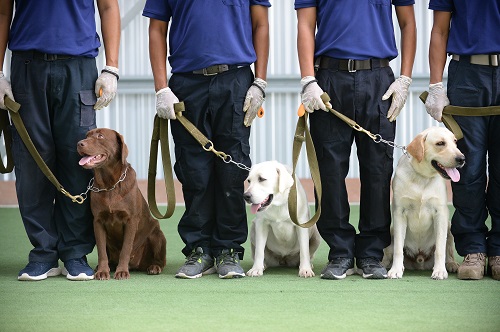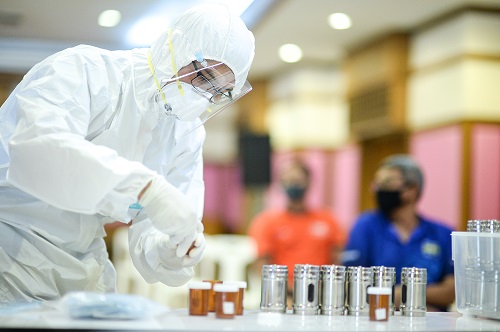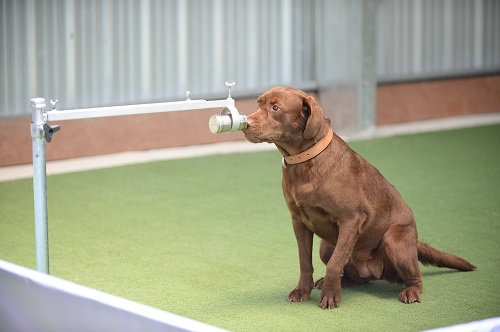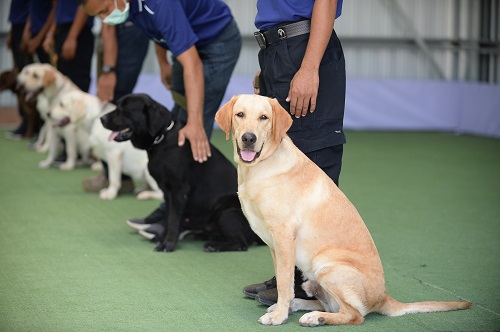press release Chevron – Chula Successfully Train Sniffer Dogs to Detect Asymptomatic COVID-19 Patients with 94.8% Accuracy
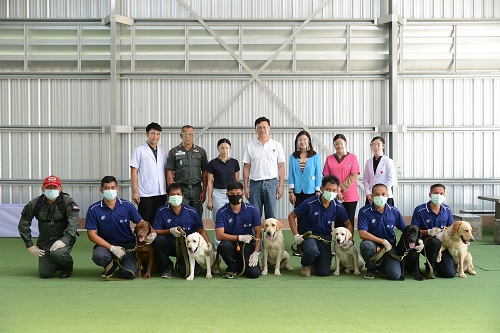
Chevron Thailand Exploration and Production Limited, in partnership with Chulalongkorn University, announced their success in training K9 dogs to bio-detect and screen COVID-19 patients, under the “K9 Dogs Sniff COVID-19” research project. As part of this research, six Labrador Retrievers were trained to distinguish both asymptomatic and symptomatic COVID-19 patients from healthy individuals with an accuracy of 94.8%. The research was led by researchers from Faculty of Veterinary Science, Faculty of Medicine, and Faculty of Science of Chulalongkorn University. While Chevron Thailand Exploration and Production Limited provided the research grant of 1,085,600 baht, PQA Associates Limited operated the field preparation and training of these K9 dogs from Border Patrol Police No. 43. This research is also considered a pioneer in training sniffer dogs for medical purposes in Thailand.
Professor Kaywalee Chatdarong, Faculty of Veterinary Science researcher, Chulalongkorn University, explained the rationale and result of the said research, “The main objective of our research is to train bio-detection dogs as a screening tool for asymptomatic COVID-19 patients, as the use of temperature scanners in the public area and airports has limitations in distinguishing infected persons without fever. In this case, the use of olfactory sense of dogs which has more than 300 million olfactory receptors, or 50 times more than those of humans. They are able to detect volatile organic compounds from patients’ perspiration which are unique from those of uninfected persons. Therefore, the use of bio-detection dogs will complement the current temperature scanners to detect more asymptomatic COVID-19 patients with higher accuracy.”
“The participating K9 dogs were trained to first recognize perspiration scents from armpits on cotton swabs and from socks of COVID-19 patients, as well as those of non-patients who are diagnosed and certified by RT-PCR method. During the research, we had a team of doctors and veterinarians to oversee the biological safety, although perspiration itself does not contain any virus. The research team had sanitized any contaminated viruses in the sweat samples, as prescribed in the international standards.
“From the research, prior to their on-field operation, all six K9 dogs were found to have high sensitivity, or the ability to detect positive samples accurately, with 97.6% accuracy and high specificity, or the ability to identify negative samples correctly, at 82.2%, making its overall accuracy as high as 94.8%. The accuracy is on par with the research in Germany, stating that the accuracy of bio-detection dogs on differentiating COVID-19 patients is as high as 94%. Additionally, when compared to the Food and Drug Administration’s (FDA) standard diagnosis kit, our dogs are even more sensitive. Therefore, our team is more than pleased to have contributed towards the success of this project. It is also considered Thailand’s first research and pilot bio-detection dogs that operate in the medical field, specifically in screening COVID-19 patients. The research team is now poised to publish their paper for the benefit of the global academia.”
In addition, Professor Kaywalee added that this research had been certified by Ethics Committee, Ministry of Public Health and Institutional Animal Care and Use Committee (IACUC) to ensure that there had been no implication on the health and welfare of staffs and K9 dogs involved. These dogs have been specifically trained for this project and its result can be used on-field with some additional design for larger operating areas.
Kingkan Kaewfun, project manager, PQA Associates Ltd., in her role as the on-field operator in K9 dogs training and preparation, said, “PQA has selected six Labrador Retrievers that had not been trained to participate in this research, because of their friendly nature and their long snouts that equip them with good olfactory sense. We proceed to train them similarly to the way we train K9 dogs to sniff drugs. For this project, Border Patrol Police No. 43 had supplied their trainers to work with PQA trainers in the 6-month training period. The K9 dogs were first trained to follow basic commands, then they were trained to sniff-screen COVID-19 patients. In doing so, there were two techniques: switching sweat samples and accuracy in sweat scent recognition. Cotton swabs of sweat of both COVID-19 patients and healthy individuals were installed on a 6-way turntable and on-way turntable to test the dogs. Once they can detect the perspiration scents of COVID-19 patients, they will sit down immediately.”
Artit Krichphiphat, business support general manager, Chevron Thailand Exploration and Production, Ltd., as the major sponsor of this groundbreaking research, said, “As Chevron operates its business in providing energy supply to Thailand, safety is one of the utmost important issues for continuous provision. Since the beginning of the pandemic, Chevron provided financial assistance of more than 13 million baht to medical professionals, government officials, as well as more than 60 organizations in combating the pandemic. At the same time, it is equally important to strengthen other medical safeguards to support Thailand’s COVID-19 response, resulting in our support in the “K9 Dogs Sniff COVID-19” project. Chevron is glad for the project’s success as Thailand’s first of its kind and we appreciate everyone’s contribution towards this success.”
“In the second phase, the trained K9 dogs will be operating in the field, where they will sniff to screen Chevron staff members who will depart for offshore locations from Songkhla screening point. Chevron strongly believes that the success of this project will become an important tool in combating COVID-19, which will, in turn, reduce cost and time in the laboratory procedure, as well as reduce the risk of infecting related medical professionals. Bio-detection K9 dogs can be used to complement temperature screening to enhance the effectiveness of the screening, especially in the public area and among those traveling to Thailand. Importantly, this research is highly valuable as an academic paper and a pioneer in training bio-detection dogs for medical purposes in Thailand.”
In the medical field, bio-detection dogs have been used to identify various illnesses, including cancer, diabetes, malaria, narcolepsy, migraine, epilepsy, and other bacterial and virial infections. Bio-detection dogs for COVID-19 patients have been used in many airports, for instance, Finland, UAE, and Australia.
